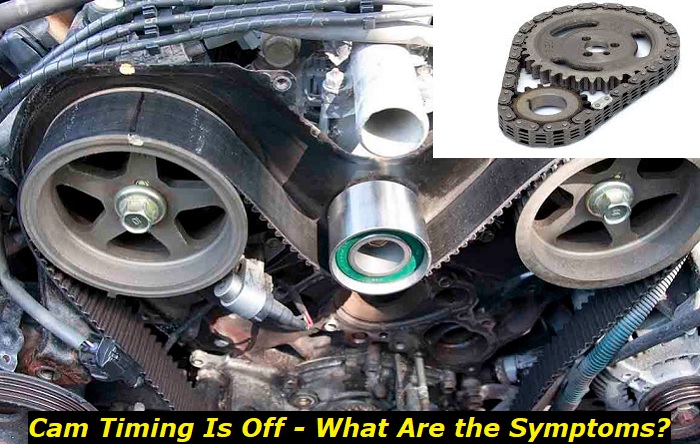When it comes to how well your vehicle is performing, timing is the key to it all. The engine timing refers to the time between the firing of the spark plugs to when the pistons in your vehicle start moving. If the engine timing is not accurate, that will have a direct effect on how your vehicle runs, including how it operates, drives, gas mileage efficiency, and much more.
Engine timing issues highlights
- Level of importance:High
- Commonreasons:Age, mileage, internal engine problems
- DIY inspection:Impossible
- DIY repair:Impossible
- Price for repair:$550 - $1,000
- Can you drive?In most cases, no
- Ways to fix:Replacement of affected parts

What Causes Cam Timing to be Off?
Heavy and strong parts/components such as pistons, valves, rods, camshafts, pulleys, and crankshaft are inside your engine that are continuously moving with great velocity. This includes the up and down movements of the pistons, valves going in and out, and pushing and pulling of the connecting rods, and at the center of it all is the wildly spinning crankshaft.
As you ride your vehicle, this synchronized symphony playing out thousands of times over and over is what drives the engine.
With the cam timing involving the pistons and the valves being in a synchronized operation, the pistons need to reach the TDC position perfectly timed, allowing the firing of the spark plugs or compressing to ignite the air-fuel mixture.
Furthermore, the pistons have to move in coordination with the intake and exhaust valves as they open and close. This timed movement completely relies on the crankshaft as it rotates from the piston's up-and-down movement.
Being a necessary part of the internal combustion process, there is absolutely no room for error with the movement of camshafts, valves, pistons, or crankshafts. Considering the speed and force of their interaction with each other, all parts must coordinate perfectly so the engine timing can be synced and run smoothly.
Furthermore, the pistons and valves fill up the same space in the cylinder of the engine, with the timing intervals being less than one second.
Therefore, can you imagine the consequence if that part of your engine timing is off? If the pistons and the valves collide and hit each other, your best scenario will be to have to rebuild the engine. However, if you are unlucky, you may end up needing to replace the entire engine in your vehicle, which is of course much more expensive to do.
Fortunately, the automakers provide their vehicles with pre-set camshaft timing. The cam timing is preserved and regulated by an engine timing belt or chain that links the crankshaft to the camshaft. If the engine timing of the cam happens to be off, your vehicle will most likely run roughly or won't be able to run at all.
Symptoms Of Cam Timing Being Off
The engine timing plays a vital role in the performance of your vehicle. Cam timing is related to most of the heavy parts/components moving explosively fast inside of the engine such as the pistons and valves. The camshaft is connected to the crankshaft by a timing belt or chain which needs to be kept in good condition.
The job of the timing belt/chain is to use the energy from the wildly spinning crankshaft to spin the camshaft. Furthermore, it is responsible for making sure that when the piston comes soaring in toward the engine's head, the valves are out of their way. A worn-out or broken belt/chain can cause the cam timing to be off and result in a total engine overhaul, costing thousands of dollars at the workshop.
When it comes to engine timing issues with your vehicle, you may be able to detect some tell-tale warning signs of a bad timing belt/chain. Driving around with a bad timing belt/chain is extremely risky as the engine of your vehicle can end up stopping abruptly in the middle of heavy traffic or on the highway.
Therefore, it is vital to be able to notice and pick up on the common warning signs and resolve the issue of your cam timing being off immediately.
1) Engine Not Starting
Since the timing belt/chain operates the crankshaft and camshaft in the engine, your vehicle will not start if the timing belt/chain is broken and/or irreparable. Without a working timing belt/chain, the engine in your vehicle simply cannot operate accurately.
Although the starter motor may attempt to engage and try to start the engine, it will not be successful without a properly functioning timing belt/chain.
2) Occasional Engine Misfires
The valves determine the timing of the engine's combustion process and are driven by the timing belt. If the timing belt is worn-out or damaged and slips causing the valves to close/open too early, this will result in the cylinder not getting a sufficient amount of fuel. Cylinders firing improperly can cause severe damage to the engine and even engine failure.
3) Rattling Noise
It is very common to hear a tick-tick-tick sound if the timing belt in your vehicle is worn-out. That noise is a clear indicator that the timing belt is on its way to wearing out and the engine of your vehicle may soon stop working. If tightening the belt doesn't solve the issue, you can check for any visible cracks or damage on the surface of the belt.
4) Irregular RPMs/Increased Emissions
Since the timing belt is used to connect the crankshaft to the camshaft in your vehicle, the RPM fluctuating irregularly could mean an issue with the timing belt. Also, the engine has to work overtime to push out the extra gas from the cylinder walls. As a result, the engine can begin to generate more smoke in case the timing belt breaks down in your vehicle.
Ways to Fix the Issue of Cam Timing Being Off
When it comes to the cam timing being off, a bad timing belt that runs between the crankshaft pulley and the camshaft pulley is most likely the main culprit. It synchronizes the engine's valves and enables the engine to run at the correct time as well as with the correct timing. Therefore, failures with the timing belt can be extremely devastating and cause the cam timing to be off.
It is common for the timing belt to fail due to tooth wear, belt tracking, and tensile failure. Making sure that the pulley crank and shaft are straight and parallel to one another is a great way to avoid such problems. You can examine the timing belt by removing the belt from the crank pulley and having the teeth on the belt evenly aligned with the teeth that are on the crank pulley.
Along with making sure that there is a tightness and grip on the belt as you rotate the pulley, you can also check the pulley for any cracks and damages. Whether from excessive heat or wear-n-tear, damaged pulleys are likely to result in misaligned teeth and excessive wear.
Remember, replacing a timing belt before it is worn out is a lot cheaper and can run between $500-$1,000 as replacing the belt/chain after it snaps can cost you as much as $2,000 for the repairs.
Conclusion
The engine timing is a significant part of your vehicle and the timing being off is a very common issue that can occur on any engine. Cam Timing and Ignition Timing are the two types of engine timing and cam timing deals with all of the heavy and forcefully moving parts/components that are within the engine. The Cam Timing is controlled by the engine timing belt/chain and is what manages the pistons and valves of your vehicle.
With modern engines being such complex machines, they can often malfunction and behave very unexpectedly. With common issues such as the cam timing being off, it is crucial to be able to diagnose and repair the engine timing problem urgently.
If you notice any of the clear symptoms and indicators pointing to the cam timing being off, you should immediately find the root of the issue and solve it before paying excessive and unnecessary repair costs.
Being responsible for rotating the engine's camshaft and crankshaft in sync, the timing belt/chain is usually the main reason behind the cam timing being off. Although many car owners have developed a sixth sense of figuring out what a bad timing belt can feel like, it is recommended to have it properly diagnosed by a professional mechanic or take your vehicle to an auto repair shop.
Driving with the cam timing off, especially due to a faulty timing belt/chain can be both hazardous and very costly to repair if you prolong it for too long.
About the authors
The CarAraC research team is composed of seasoned auto mechanics and automotive industry professionals, including individuals with advanced degrees and certifications in their field. Our team members boast prestigious credentials, reflecting their extensive knowledge and skills. These qualifications include: IMI: Institute of the Motor Industry, ASE-Certified Master Automobile Technicians; Coventry University, Graduate of MA in Automotive Journalism; Politecnico di Torino, Italy, MS Automotive Engineering; Ss. Cyril and Methodius University in Skopje, Mechanical University in Skopje; TOC Automotive College; DHA Suffa University, Department of Mechanical Engineering






Add comment